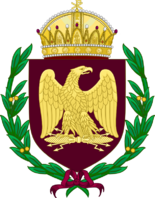Politics of Latium
| This article is part of a series on the |
| Politics of Latium |
|---|
 |
Latium is a constitutional monarchy with a unicameral legislature. Its executive and head of state is the Monarch, which is currently Emperor Constantine XX. The legislature of Latium is the Senate, which is the single oldest government institution in the county. The Senate is officially headed by the Monarch, who serves as Princeps Senatus, though the highest elected member of the Senate is the Consul, who unofficially acts as head of government.
The Latin political system is a multi-party system, dominated by two major parties with minor and third parties having various levels of electoral success. Since the 1860s, the two largest political parties were been the Imperial League, which later became the Conservative and Imperial Party following the Social War, with the Greek Imperials either being absorbed or leaving to form the Greek National Party, and the Liberal Party, though the main center-left party is now the Progressive Party. Coalition and minority governments have been a feature of senatorial politics periodically over the last century due to the first-past-the-post used for general elections tends to maintain the dominance of these two parties, however there have been attempts to adopt more proportional voting systems. The current government is composed of the United Latium majority, with Alexander Pompilius serving as Consul since 2016.
The judiciary of the State has been tied to both the executive and legislature since the Alban Kingdom. Historically, the courts were made up of members of Curiate and People's Assemblies in the Republican Senate and later the Advisors to the Emperor. Today the highest court in the land is the Supreme Court.
Government
Latium operates with an uncodified constitution, where the country's fundamental rules come from a variety of legal instruments, statutes, customs and imperial decree. Officially, the country is classified as a unitary parliamentary executive monarchy, meaning the Monarch holds and exercises executive power of the state.
Emperor
The Monarch is the dominant figure in Latin politics. He appoints the Consul, which by convention is generally the leader of the largest political faction in the Senate. He or she appoints ambassadors, ministers, and secretaries, though often time consults with government. The Monarch is a non-partisan figure in Latin politics, even though most tend to publicly favor a particular party, because it is the Imperial Office's duty to "act with the best benefit of the state in mind." However, on the occasion when a party from a different political ideology of the Monarch wins a general election, the Monarch must ask that party leader to form a government, unless a potential minority government comes forward with a coalition.
Some of the Emperor's powers include: ability to provide Imperial assent to a senatorial bill or veto the action, authorize military action for up to a year with out Senatorial declaration of war, sign treaties and trade agreements, direct foreign policy, nominate judges (both on the national and local provincial level), and the ability to directly introduce legislation, just to name a few.
Legislative branch
The Senate is one of the oldest institutions of Latium, dating back to the 8th century BC as the Alban council of elders. The first recorded written records of the Senate are dated to the 6th century BC. The Monarch is the head of senate by virtue of being Princeps Senatus, literally "first man of the senate." However, following numerous reforms in both the 1860s and 1950s, the senate is the unicameral legislature of Latium. The Consul serves as the head of government due to its role as the leader of the cabinet; however, cabinet is chaired by the Monarch. The Consul serves as the Monarch's chief government minister, and presiding officer of the Senate. Historically, the Consul was not responsible to the Senate, but solely to the Monarch. Since the 20th century, the Consul is typically the leader of the largest party or group of parties in the Senate, causing the sitting consul to hold both the confidence of the Monarch and a majority of the Senate.
Today the Senate consists of 779 senators, 673 of which are elected from single-member constituencies, and 106 of which are life senators. Senators are elected through single member districts with a rough population of 98,000 per district. Senators traditionally must live in their constituency, though this is not always the case, for example with major party leaders. The Senate holds authority over financial and budgetary matters. Legislation is enacted by the Princeps Senatus whereby the Senate and Consul may pass legislation within the legislature, but also provides the Monarch an integral role in signing, aiding in drafting and negotiating, and sometimes even proposing legislation. There are also mechanisms that allow members of the Senate to bring to the attention of the government particular issues affecting their constituents.
The Senate Building, often referred to as Curia Claudia or more irregularly, Palatium Forum, is located near the Forum in Castellum ab Alba.
Ministries
Ministers and Secretaries of the Latin Cabinet are nominated and appointed by the Monarch, pending Senate approval. In practice, the Monarch must usually must nominate a candidate that reflects the will of the majority in the Senate, which allows the Consul some ability to advise the Monarch to consider certain individuals for certain ministries. Cabinet nominees must be a Latin citizen, but with few exceptions, largely hold seats in the Senate.
Judiciary
Courts in Latium are nominally independent, enjoying certain statutory protection from the Monarch or the Senate. The court system consists of three types of courts: ordinary courts, which handle criminal and civil litigation; administrative courts which supervise the government and handle complaints; and extra ordinary courts, which handle matters relating to probate, patent or trademark, and the regulation of peerages, titles, and arms. Each court form may also be broken down into any number of courts, though all include courts of original jurisdiction, appellate courts and courts of last resort. Judicial appointments are typically made by the Emperor and require a 2/3 confirmation vote by the Senate. Once appointed, judges serve for life and cannot be removed without specific disciplinary proceedings conducted before the Imperial Judicial Board.
Local government
Regions
Regions are officially the top level of administration of local governments; there are eight total regions. Prior to 2011, regions each had an appointed regional council which held little in the way of effective power. At the passing of the Local Government Reform Act in 2011, all regional councils were abolished and effectively stripped of the limited powers they held. Today, regions are little more than a geographic measure utilized by the government when it comes to distributing things like healthcare funds.
Devolved administrations
There are three devolved governments in Latium: Castellum ab Alba, Gelonia, and Byzantion – all of which hold differing levels of autonomy. Each regional government is led by an appointed Exarch, or elected Mayor in Castellum, who serves as the Monarch's chief representative. An exarch presides over the regional assembly, may exercise veto on legislative proposals upon consultation with the Monarch, and may advise the Monarch to exercise his right to dissolve the assembly.
Second Level Divisions
Second level administrative divisions in Latium are the first level of local government which receive functional governmental powers. These second level divisions consist of either counties or unitary authorities. These county divisions are largely based upon more ancient or medieval ceremonial counties which served as functional local governments prior to the Social War. All second-level divisions are governed by an elected county council of anywhere from 50 to 163 councillors and a Propraetor appointed by the Monarch.
Constitution
Political parties and Elections
Elections
There are five types of elections in Latium: Latin Empire general elections, elections to county councils and assemblies, elections to the city commissions and councils, various local elections, and mayoral elections. Elections are held on election day, which often falls on a wednesday or thursday. General elections did not have fixed dates, with a necessity for them to be called within five years of the opening of parliament following the last election, before the passing of the Fixed-term Parliaments Act 2011. Local elections are generally held every year in a staggered setting, with nearly 1/4 of all local council seats up for election every year. Currently, three electoral systems are used: the single member plurality system (First Past the Post), the single transferable vote, the Additional Member System and the Supplementary Vote.
Elections are administered locally: in each lower-tier local authority, the actual polling procedure is run by the appointed Imperial Electoral Commission officer or Returning Officer and the compiling and maintenance of the electoral roll by the Electoral Registration Officer. The Imperial Electoral Commission sets standards for and issues guidelines to Returning Officers and Electoral Registration Officers, but is responsible for nationwide electoral administration (such as the registration of political parties and directing the administration of national referendums). The Electoral Commission is also responsible for determining the number of constituencies that are located in each province, but allows for provinces to have a large deal of input. Constituencies for Senatorial elections generally consist of a geographic area with the population of around 975,000 people. Gerrymandering is strictly forbidden by the Code of Law, requiring constituencies be largely left within a single county, only allowing constituencies to pass through one other county.
Political Parties
There are two main political parties in Latium: United Latium and the Progressive Party. The Citizens – Popular Alternative is the third largest party by Senate representation by membership.
United Latium, while founded in 2017, is the legal successor to both the Conservative Party and the Imperial League, making it one of the oldest political parties in Latium. The Progressive Party is the second largest party by Senate representation and party membership, and was first formed in 1991 by a group of former Liberal Party members led by Samuel Velius. The Progressives most recently held the Consulship from 1998 until 2014.
The Liberal Party was the first political faction formed in Latium, and has undergone repeated changes since the late 20th century. The Liberals were originally one of the dominant parties, along with the Imperial League and it's Conservative successor, until 1991 and the split which saw the Progressive Party formation. The Liberals would remain the third largest party and undergo a merger with the Labor Party and remain the third largest party until it's demise in 2017 and the creation of the Liberty Union Party. Since the rapid decline of the Liberals in the 21st century, the EEK has become the third largest party by Senate representation, holding nearly half of all seats contested in Hellenic majority counties.


